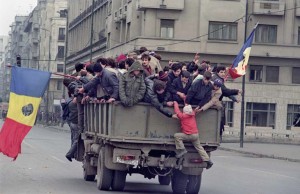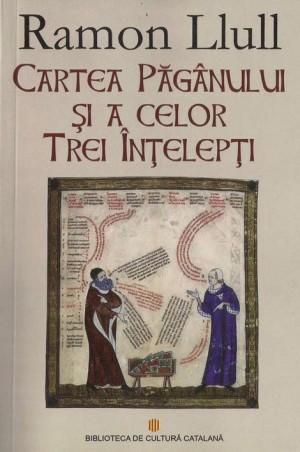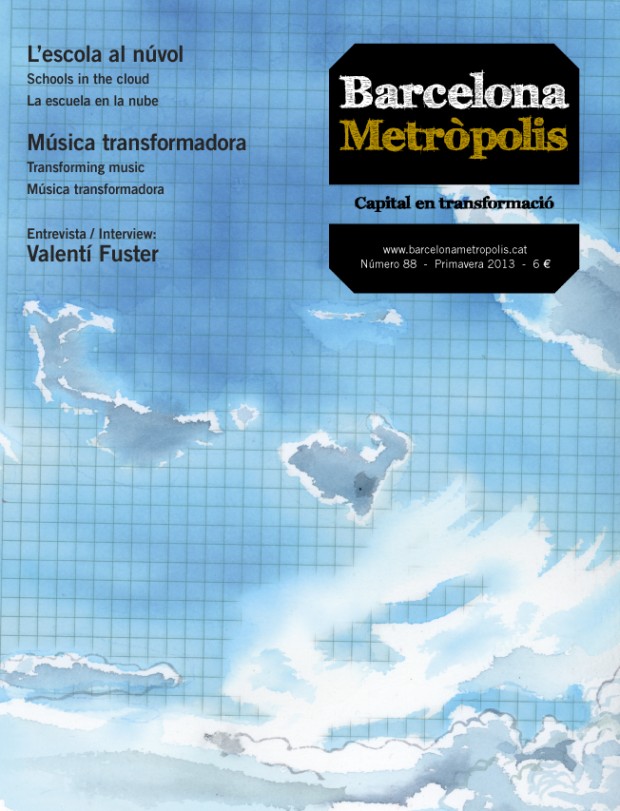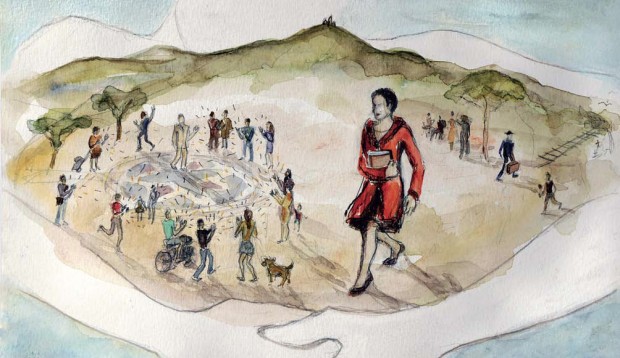Coming to Barcelona to study Catalan, two decades ago now, was a turning point in Jana Balacciu’s life. She came from a sad city, still licking the open wounds of the dictatorship and the revolution, to a totally new world, where sunlight, the light of open spaces and the light of people’s eyes prevailed.
When I alighted from the train in Portbou on 1 July 1999 to clear customs and take the Barcelona-bound train, little did I imagine that this trip would change my life. I was a re-searcher in Romance Languages at the Institute of Linguistics in Bucharest and was en route to the Catalan capital to learn, at the tender age of 44 (better late than never!) to actually speak its language. For years I had been fascinated by its literary splendour of the Middle Ages, its resistance when the language was forbidden and its recovery as a language for culture. But I did not know the living language.
That day in Portbou, I did not know that the philosopher Walter Benjamin committed suicide in 1940 or that I would become a translator of Catalan literature, striving to do what he urgently exhorted the translator to do: echo the original in the translation. And neither did I imagine that fifteen years later, striving to answer, now in Romanian, the call of the narrator of La meitat de l’ànima [Half the Soul], the novel by Carme Riera, I would have a “spell” in Portbou immersed in the history of the Catalan diaspora. After a stifling two-day train journey traversing three countries (about 2,500 kilometres, now a mere three-hour flight away), I only wanted to reach Barcelona once and for all.
I will never forget my first stay in the city. Up until December 1989, I had lived in “the best of worlds”, as the communist propaganda line held, so good a world that it had not allowed me, or the majority of my compatriots, to go abroad to draw our own comparisons. I hailed from a city with large wounds opened up not only by the revolution of that year, but also by all the years of the dictatorship. A gloomy city, with blocks of grey flats “spied on” by the House of the Republic, the world’s second-highest building, an indelible footprint of Nicolae Ceau?escu’s megalomania. I spent the following year engulfed in the quicksand of the transition-bound Romanian world, from which it has been unable to extricate itself as yet. I was suddenly absorbed into another world, into the light. Not just the light that came from the sun (there was plenty of that in Bucharest, although it seemed almost diseased), but rather the bright light of open spaces, the filtered light of the cathedral cloister or the stained-glass windows of Santa Maria del Mar, the iridescent light of Gaudí’s houses. And above all, the light in people’s eyes, people who, as I would learn much later, were and felt committed to a common project, one which I might describe now as rash, but which was fuelled by the famous Catalan wisdom – the 1992 Olympic Games. I looked at the posters, which literally shouted out “Barcelona posa’t guapa” [Barcelona, get pretty], delighted at that playful and affectionate way of talking about and to the city.

© Joel Robine / AFP / Getty Images
On 22 December 1989 the population of Bucharest flooded onto the streets and, as the Army adopted a passive stance, brought down the Communist regime. Above, a truckload of civilians flying Romanian flags with the regime’s symbol cut out.
I must have been one of the 1.5 million tourists who, according to the statistics, visited the city in 1991, although under no circumstances did I feel like one. I felt at home, as I had dreamed I would. As my classes were in the evening, I had all the time in the world, like I had never had before, or would ever have again. I would walk for miles and miles, without guidebook or camera, needing neither of the two. I missed nothing, gazed at the Pedrera or the Casa Batlló in awe (the great tourist invasion was yet to come). I felt great surrounded by all those smiling strangers (or perhaps I only saw what I needed to see), my ear cocked towards them, like a “word hunter”, to improve my Catalan (it is a pity I never came upon the Man with the Suitcase, the character from Ramon Solsona’s novel, L’home de la maleta, with his fresh, albeit polluted, Catalan). I feasted on light. Without realising, I was following the advice of the poetry of Carles Duarte: “Arrela’t en la llum que inaugura els colors” (take root in the light that opens up the colours). I was conversant with the events of Franco’s dictatorship, but Jaume Cabré had yet to write L’ombra de l’eunuc [The Eunuch’s Shadow], to make me understand, not just in my mind, but in my heart too, just how difficult it had been to kindle that light in many of those eyes. A great deal of time has elapsed since then, not just “the time of the clouds and the sun and the rain…” but also the “time inside me, the time you don’t see and it kneads us”, as Mercè Rodoreda’s Colometa so poetically put it in The Time of the Doves.

© Meronia Publishers
The cover of Book of the Gentile and the Three Wise Men, by Ramon Llull, translated into Romanian by the author of the article, and published by Meronia.
I have been to Barcelona many times, I have experienced the festive nights of Sant Joan there, the la Mercè festivals, Sant Jordi’s day; I have been caught in the rain; my eyes have taken in the city’s wonders. I have met many people and made many friends; I have felt the pain of losing some of them. I am proud that key figures of Catalan culture have put their trust in me as a translator or publisher, and I am grateful to them for that. “My” Barcelona has taken on new dimensions, new voices, new colours, new nuances from its past or present. But that first vision will never leave me. The image of life itself, whose messages seemed to be intended for me. As if you could take them home and change your life in one go. I will always remember one evening when, in Plaça de Catalunya, people started to applaud a gentleman wearing an elegant light-coloured suit. They said it was the city mayor. The circumstance inspired admiration in me, tinged with a hint of envy. The mayors of Bucharest that I had known, party activists appointed by the dictator in elections that were a mere formality, never went walkabout, and had they done so they would hardly have met with impromptu applause. One day, I said to myself, this will also happen in Bucharest. I am still waiting. One day (2007 in fact), Romania will join the European Union, said that great Pro-European Jordi Pujol, who honoured me by receiving me in his Catalan Government office in 2003.
Barcelona was and is about all that: it gifted me experiences and hope, and still does. I have spent so long talking about my first stay in Barcelona because that summer of 1991 heralded, as Colometa would say, a turning point in my life; it was a watershed, albeit totally different to the changes befalling that famous character, because since then my life has been blessed by all kinds of projects, including one that makes me feel that I also belong to this city: taking the city to Romania via the Biblioteca de Cultur? Catalan? Collection, which I started in Meronia Publishers in 1998, and which has now reached thirty-five volumes. So that Romanians, even those who are already familiar with its charm, may also hear, amid the merry voices of the tourists (I know there are too many, but it is a source of income that Bucharest could do with in these times of crisis) in La Rambla, as well as the voices of the bells of Barcelona at the time when the Catalan government had been replaced by the Royal Audience. So that they might wonder, and even find some answers, as to how, for a period of just over three decades after the fall of Franco’s dictatorship, we came to regard Barcelona as a mythical city. So that any Romanian, or Romanians, who might have managed to get a glimpse of the flags fluttering in the wind on 11 September 2012 will remember the Rodoredian fresh air of the Republic “mixed with the smell of new leaves and the smell of flower buds”, which many Catalans, with the “gait of an old woman and the hands of a castaway”, as Maria Mercè-Marçal said, were never to hear again. So that they will realise that there are people, like the Catalan people who, even in times of crisis like the present, can build forward-looking projects. Long may it be so!





Jana Balacciu Matei, estimada amiga. Quin regal per als catalans, la teva feina. I per als romanesos, és clar. Jana Balacciu Matei, una dona que fa de pont entre cultures.
Aquest comentari de la Jana Matei és la millor propaganda que es pot fer de Catalunya, de la seva gent i de la seva literatura. Tant de bo poguéssim correspondre oferint als lectors “biblioteques” d’altres cultures com la que ella ofereix als romanesos. Una peça antològica que cal divulgar. Gràcies.
Fantàstic, Jana! M’ho he passat molt bé passejant amb tu per la meva ciutat.
Molts petons des de Farrera,
Lluía